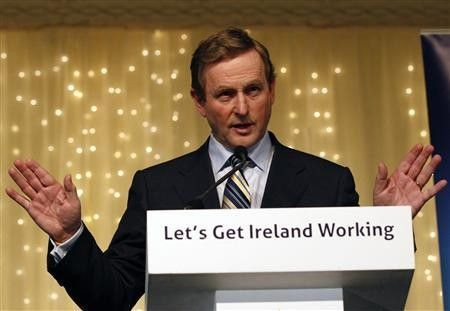Ireland parties talk coalition and seek bailout changes

Irish opposition parties started coalition talks on Monday after a resounding election win gave them the mandate to renegotiate an EU-IMF rescue deal they fear will bankrupt the former Celtic Tiger economy.
Though a new government looks likely to get its way on a reduced interest rate on its EU loans, with Brussels signalling this could be on the table, its demands for bondholders in Irish banks to shoulder more losses have little support in Europe.
We have a common goal for Ireland to revive its growth dynamic and succeed in ensuring debt sustainability, Economic and Monetary Affairs Commissioner Olli Rehn said on Monday.
Pricing policy, I am referring to the interest rates, is one key issue here which will be discussed in the context of the comprehensive strategy of the European Union.
Ireland's centre-right Fine Gael party, led by Enda Kenny, was swept into power over the weekend in a parliamentary election dominated by anger at the country's financial meltdown and the harsh cure prescribed by Europe.
Kenny, and Eamon Gilmore, leader of the centre-left Labour party, are due to meet for talks later on Monday about forming a coalition, broadcaster RTE reported.
A Reuters poll on Monday underlined the mammoth task facing the new government, which will have to oversee cuts in public spending, introduced by the last government, to slash debts.
Dublin is relying on its buoyant export sector to deliver gross domestic product (GDP) growth of 1.7 percent but the 11 economists polled by Reuters now expect only 1.2 percent, down from 1.4 percent in the last survey.
Market reaction to the election result was muted. The 10-year Irish/German bond yield spread was a two basis points tighter on the day at 621 bps while the cost of insuring Irish debt against default was little changed at 595 bps.
Fine Gael is set to win a record 75-plus seats in the 166-seat lower house and Labour party should get more than 35.
Both parties want a cut in the interest rate Europe is charging on its portion of an 85 billion euros bailout as part of a regional-wide deal on resolving the bloc's debt crisis set to be agreed at a March 24-25 summit.
Though a symbolic victory for the prime-minister-to-be, reducing the rate would not make much of a dent in Ireland's 155 billion euro (131 billion pounds) debt mountain, and euro zone ministers have signalled for some time they would consider it.
More significant would be imposing losses on some senior bondholders in Irish banks. Both parties have called for this, but the European Central Bank, on which Ireland's banks rely for funding, is deeply opposed for fear of the contagion risk.
CONCESSIONS
Nevertheless, Kenny may seek to use the threat of unilateral action in this area to wrest other concessions.
Fine Gael would like Europe to extend the period for shrinking its banks to prevent a fire sale of assets which would trigger yet more losses that Dublin would have to underwrite.
Ireland has already poured in 46 billion euros to shore up its banks and the new government is holding off injecting more until new stress tests are completed by the end of March.
The number of Irish mortgages in arrears jumped by over 55 percent last year, data on Monday showed, highlighting the stress the sector and consumers are under.
Rather than funnelling more money into its lenders, at the heart of Ireland's financial crisis, Fine Gael would prefer Europe to take direct stakes in its two largest banks Bank of Ireland and Allied Irish Banks or set up an insurance scheme to cover future loan losses.
The risk for Kenny is that in return for such concessions, Europe could demand Ireland raise its low corporate tax rate, viewed as anti-competitive in higher tax European capitals.
© Copyright Thomson Reuters 2024. All rights reserved.





















